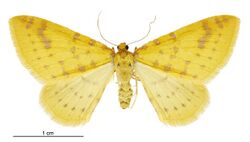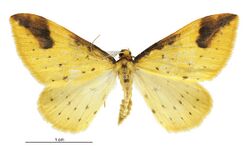Biology:Orthoclydon chlorias
| Orthoclydon chlorias | |
|---|---|

| |
| Female | |

| |
| Male | |
| Scientific classification | |
| Kingdom: | |
| Phylum: | |
| Class: | |
| Order: | |
| Family: | |
| Genus: | |
| Species: | O. chlorias
|
| Binomial name | |
| Orthoclydon chlorias (Meyrick, 1883)
| |
| Synonyms | |
| |
Orthoclydon chlorias is a species of moth in the family Geometridae. It is endemic to New Zealand.
Taxonomy
This species was first described by Edward Meyrick in 1883 under the name Larentia chlorias.[1][2] Meyrick went on to give a more detailed description of the species in 1884.[3] In 1903 George Hudson, thinking he was describing the species for the first time, also named the species Venusia princeps.[4] In 1905 Meyrick synonymised this name and placed this species within the genus Xanthorhoe.[5] In 1928 Hudson illustrated and discussed this species in his book The Butterflies and Moths of New Zealand under its current name Orthoclydon chlorias.[6]
Description
Meyrick described the species as follows:
Male.— 30 mm. Forewings moderate, hindmargin hardly rounded; bright yellow; base of costa dark fuscous-purple; a curved row of three very small dark purple-fuscous spots about J, and another of four spots before middle, costal spots larger; a triangular purple blotch on costa before apex, reaching half across wing, anteriorly margined by a strongly sinuate bluish-black streak; a row of three dark purple-fuscous dots from apex of this to inner margin, and a subterminal row of six similar dots; cilia yellow. Hindwings moderate, hindmargin rounded; rather paler than forewings, with two curved posterior rows of cloudy purple-fuscous dots.[3]
Distribution
O. chlorias is endemic to New Zealand.[7] Meyrick first collected the species at near Castle Hill.[3] The moth has subsequently also been found at Mount Hector, Tararua range, Dun Mountain, and at Dunedin.[6]
Plant hosts
O. chlorias larvae feed on the leaves of Gaultheria species.[8]
References
- ↑ Dugdale, J. S. (1988). "Lepidoptera - annotated catalogue, and keys to family-group taxa". Fauna of New Zealand 14: 186. https://www.landcareresearch.co.nz/__data/assets/pdf_file/0017/26324/FNZ14Dugdale1988.pdf. Retrieved 21 December 2018.
- ↑ Meyrick, Edward (1883). "Monograph of New Zealand Geometrina [abstract"]. New Zealand Journal of Science 1: 526–531. https://biodiversitylibrary.org/page/41866183.
- ↑ 3.0 3.1 3.2 Meyrick, Edward (1884). "A monograph of the New Zealand Geometrina". Transactions and Proceedings of the New Zealand Institute 16: 49–113. https://biodiversitylibrary.org/page/33245720.
- ↑ Hudson, G. V. (1903). "On some new species of Macro-lepidoptera". Transactions and Proceedings of the New Zealand Institute 35: 243–245. https://biodiversitylibrary.org/page/3295334.
- ↑ Meyrick, Edward (1905). "Notes on New Zealand Lepidoptera". Transactions of the Entomological Society of London 53: 219–244. https://biodiversitylibrary.org/page/14788040.
- ↑ 6.0 6.1 Hudson, G. V. (1928). The Butterflies and Moths of New Zealand. Wellington: Ferguson & Osborn Ltd.. pp. 107. OCLC 25449322. http://www.bugz.org.nz/WebForms/ResultDetails.aspx?CurrentDoc=C7E94865-492F-45DA-9777-CC8E1E8B1438&CurrentPage=1&searchType=1&StartChar=%ufffd.
- ↑ , p. 460, Wikidata Q45922947
- ↑ "Invertebrate herbivore biodiversity assessment - Orthoclydon chlorias". Manaaki Whenua - Landcare Research. https://plant-synz.landcareresearch.co.nz/ReportForm.aspx?RecordId=1556&Type=H&ReportType=Adv&SortBy=Alpha&Biostatus=a,c,e,n.
Wikidata ☰ Q13549201 entry
 |

